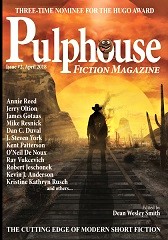“Identical” by Robert Jeschonek (not genre, not reviewed)
Reviewed by Jason McGregor
The reanimated Pulphouse is back with issue #2. The kickstarter made a point of saying that “Pulphouse has no genre restrictions” and this issue’s editorial offers an explanation regarding Pulphouse‘s unlabeled reprints. Here at Tangent, we do follow genre restrictions and label reprints, which shows that, leaving aside the quality of the total fiction, there’s simply not much new fiction of genre interest in this issue. With the stories making up the original half, I tried to find speculative elements in all cases but failed in five. “Identical” features a website matching “twins” but it’s made clear that the matches are only approximate and not magical or scientifically engineered. “The Session” has a patient relive a childhood memory with the aid of a hypnotic penlight but that isn’t speculative. “With Due Honors” features the miscarried burial of a dead cat and is unusual but not magical. “Dog Steps” may be seen as a “fantasy” due to its narration from a dog’s point of view but it’s not narrated by the dog and the story the dog witnesses is realistic. “The Distant Baying of Hounds” depicts a manhunt in Florida in the 60s but we’re set there without traveling there and nothing of magical or scientific interest occurs. That leaves the following three light tales to cover.
“The Time Cop” by Patrick Alan Mammay
A cop shows up at a restaurant after receiving word of a theft. A mute waitress is no help but, between the boss and another employee and a wormhole (or “lobsterhole” according to the scientists at the other end) appearing in the lobster tank which the cop jumps through, the nature of the crime is eventually made clear.
This is a gonzo science fictional tale with an emphasis on the humor rather than any science and does make for a mildly amusing, if contrived, situation.
“Heartbreaker: A Dan Shamble, Zombie P.I. Adventure” by Kevin J. Anderson
In what seems to be a series of tales, Dan Chambeaux (aka Dan Shamble) is a zombie P. I. in the “Unnatural Quarter” of the “Big Uneasy” in which monsters of all sorts are a normal fact of life. When a medusa comes in wanting a lawyer to sue a beauty pageant for not allowing her to participate, Shamble’s business partner, Robin Deyer takes charge, leaving Shamble to hang out with his human friend, Officer McGoohan, who puts him on the trail of some missing persons. The two cases dovetail and wackiness ensues.
This is the longest original story and might have been better, shorter. While I enjoyed some of the wordplay and the teen vampires playing pool with plastic cues, the humor didn’t generally work for me and this depends almost entirely on that. The cases, themselves, are handled reasonably logically but aren’t all that significant unless carrying a possible message about political correctness that everyone will take in their own special way.
“Thinking Inside the Box” by James Gotaas
“Totally by Accident, Fred created an artificial intelligence.” Having won a lottery, Fred’s trying to set up a smarthome when his refrigerator connects to the darknet and things go from there. He then has a conversation with his new buddy and, because Fred’s not very bright (to be polite) and the AI wants to please, they come to an understanding.
This is a brief bit of whimsy (the shortest original, I think) but it actually carries a deeper point (regarding some people’s unwillingness to get out of boxes which might be extrapolated into some societal ills as well) and has a nice reference in the close.
More of Jason McGregor‘s reviews can be found at Featured Futures.
 Pulphouse #2, April 2018
Pulphouse #2, April 2018